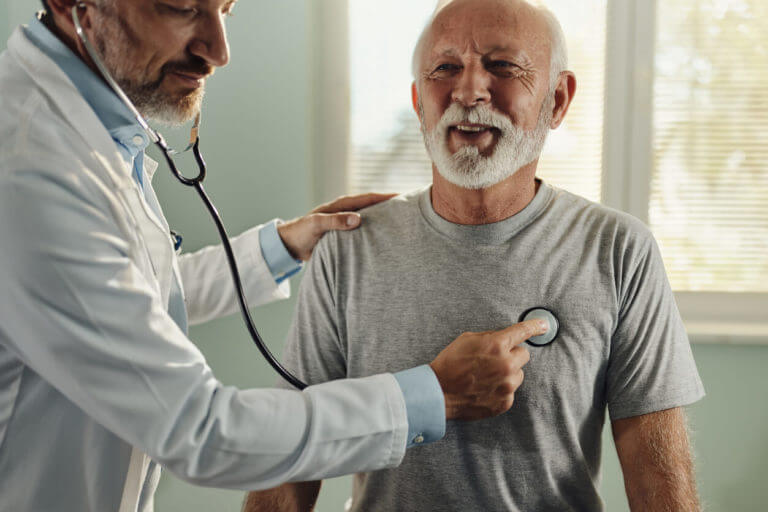
If you’ve been referred to a cardiologist for the first time, you may be feeling anxious and unsure about what to expect.
Cardiologists are medical doctors specializing in diagnosing and treating heart conditions, but many patients don’t know what their first appointment will entail.
Let’s explore when to see a cardiologist and what to expect when you see a cardiologist, including what to bring, what tests you may undergo, and what your treatment options might be.
When to See a Cardiologist?
Primary reasons for being referred to a cardiologist include experiencing symptoms like chest pain, shortness of breath, dizziness, or high blood pressure.
Additionally, if you have a family history of heart disease or risk factors such as high blood pressure or cholesterol, it is crucial to see a cardiologist regularly to monitor your heart health.
Cardiologists also handle cardiovascular diseases such as heart attacks, heart failure, arrhythmias (irregular heartbeat), hypertension, and others.
What to Expect?
If you have scheduled an appointment with a cardiologist, here is a brief overview of what you can expect during your appointment.
Pre-Appointment Preparations
Before your appointment, it’s important to gather any relevant medical records and write down key personal information, including any major stresses or recent life changes. Make a list of all OTC and prescription medications, vitamins, or supplements you’re taking. It’s also helpful to write down questions to ask your doctor to ensure you cover everything that’s on your mind.
You can also expect to receive some specific preparatory instructions from your cardiologist’s office.
Medical History and Physical Exam
Typically, your appointment with the cardiologist will start with a comprehensive medical history review and a physical examination.
Your cardiologist will ask about your symptoms, family history of heart disease, lifestyle (such as smoking, caffeine and alcohol consumption, diet, and exercise), and other existing health conditions. This will help them get a complete picture of your health history.
Next, they will perform a physical exam, which may include listening to your heart and lungs, checking your blood pressure, and examining your blood vessels.
Diagnostic Tests
Depending on your symptoms, medical history, and result of physical examination, your cardiologist may order some diagnostic tests to diagnose a heart condition and assess its severity.
Some common diagnostic tests used by cardiologists include:
- Electrocardiogram (ECG): To measure the electrical activity of the heart
- Echocardiogram: To create detailed images of the heart’s structure and function
- Stress Test: This involves exercising to make your heart work hard and beat fast while heart tests are performed.
- Blood Test: To measure cholesterol levels or other problems that could be contributing to your heart problems.
Treatment Plan
After the tests are complete, your cardiologist will review the results with you and discuss potential treatment options. Cardiologists work with their patients to determine the best course of action based on the severity of the condition and the patient’s overall health.
Treatment options for heart conditions can range from lifestyle changes and medications to more invasive procedures.
- Lifestyle Changes: This is often the first step in treating heart conditions and includes healthy eating, regular exercise, quitting smoking, limiting alcohol, and managing stress.
- Medication: Cardiologists can prescribe various medications to treat heart conditions. For instance, blood thinners prevent clots, beta-blockers lower blood pressure, statins reduce cholesterol, and ACE inhibitors help relax blood vessels.
- Procedures or Surgeries: In more severe cases, procedures like angioplasty (to open blocked arteries), stent placement, pacemaker implantation, or even heart surgeries like bypass surgery or valve replacement may be necessary.
- Cardiac Rehabilitation: This is a medically supervised program designed to improve cardiovascular health following a heart attack, heart surgery, or heart failure. It includes exercise, education on heart-healthy living, and counseling to reduce stress.
- Regular Monitoring: Regular check-ups allow the cardiologist to monitor the patient’s condition and adjust treatments as needed.
Cardiologists also work closely with other healthcare professionals, such as primary care physicians, cardiac surgeons, and rehabilitation specialists, to provide comprehensive care for their patients.
Cardiologists Near Me in West Orange, New Jersey
Seeing a cardiologist can be intimidating, but it is essential to take care of your heart health. If you are experiencing any warning signs or have risk factors for heart disease, don’t hesitate to seek medical attention from our highly qualified and experienced cardiologists here at Hudson MD Group.
Our cardiologists are committed to offering an accurate diagnosis and personalized treatment for a comprehensive range of health and blood vessel disorders. We also offer in-office diagnostic tests for heart and blood vessel disorders to save you money, time, and the hassle of looking for a diagnostic testing facility.
If you want to make an appointment with our cardiologist at our multispecialty medical practice, call our staff today at (973) 705-4914 or use our convenient online form. We look forward to serving you!


